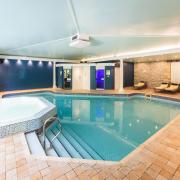More and more people are turning to hypnotherapy to help with a range of issues. Roger Borrell spoke to Caroline Dawe

Mention the word hypnosis to many people and it will probably conjure up an image of stage acts where hapless ‘victims’ are plucked from the audience and made to do ridiculous things – anything from eating a raw onion to taking off their clothes off.
This public persona is, understandably, a source of great irritation to qualified hypnotherapists such as Caroline Dawe. It’s one of her ambitions to change the image of this complementary treatment that is now being used for a wide range of conditions.
Caroline, who is based in Wigan, has a very good reason to champion hypnotherapy. She says she is living proof of its efficacy.
‘I had a nasty fall and fractured both my knees,’ she says. ‘It turned out to be a life-changing experience because complications set in and I was told I needed two artificial knee replacements.’
Caroline had spent a large part of her career working in the health service, but it was mainly in administration and the prospect of having surgery unnerved her.
‘I’d never had an operation and I was very apprehensive about it,’ she said. ‘Someone recommended hypnosis as a way of dealing with my anxiety and I have to admit I was quite dubious.
‘I did some research and was still dubious but decided to give it a go and after just one session the effect was remarkable. My concerns started to dissipate. Not only did it help pre-surgery but after the operation doctors said the speed of my recovery had been amazing.’
Caroline, who has lived in Wigan with her partner for 12 years, became fascinated by this alternative treatment. She had been looking for a career change that would bring her more into contact with people and was training to be a counsellor. Her experience with hypnotherapy convinced her that combining the two could help her to achieve her ambition.
She spent 18 months gaining qualifications and she started to practice, first from home and now from Bank Chambers, around two years ago. She is registered with the Complementary and Natural Healthcare Council and the General Hypnotherapy Standards Council as a Accredited Practitioner.
Since then, she has found an increasing number of people keen to use her services. Many of her clients suffer from anxiety and that was particularly true in the busy run-up to Christmas. ‘The pace of life these days and the pressure to be better, strong and confident in social situations means that many more people seek help,’ she says.
However, one of her recent success stories involved a woman in her 90s. ‘She was an inspiring lady but she had been frightened of the dark since childhood. She lived with her daughter and she was very concerned about her going on holiday and being left at home.
‘I convinced her that it was never truly dark because of the moon and stars and she became more relaxed, less fretful and started sleeping well. In the end, the fear had gone.
‘I also had a lady who was agoraphobic. She hadn’t been out of the house alone for four years and her partner always brought her to and picked her up from our sessions. Then, during one session she announced she was getting the train home. Her family couldn’t believe it.’
So how does it work? According to the textbooks, hypnosis is thought to work by altering our state of consciousness in such a way that the analytical left-hand side of the brain is turned off, while the non-analytical right-hand side is made more alert. The conscious control of the mind is inhibited, and the subconscious mind awoken and that can make you receptive to positive thoughts.
There are no swinging fob watches or conjuring tricks in Caroline’s working day. Much of what she does involves relaxation techniques and breathing exercises. Clients are encouraged to image themselves in different scenarios and consider positive aspects of the things that trouble them to build up confidence.
‘People are never asleep or unconscious during hypnosis,’ she says. ‘They are able to talk and remain in control. This means they don’t have to answer questions if they don’t want to and they can stop the session whenever they please.’
Caroline’s charges vary depending on the treatment but a general rule of thumb is around £50 a session. ‘But I can sometimes offer discount to people who are hard up or on benefits,’ says Caroline. ‘I really want this to be accessible to all.’
The NHS and NICE, the body for clinical excellence, recognise that hypnotherapy can be used for many different conditions but the lack of major quality research means that health experts struggle to explain why it works.
However, attitudes are changing and some updated research is expected during 2018. In the meantime, one finding that will please Caroline and her colleagues is that most people are positive about hypnotherapy, and would consider its use under the right circumstances.
Perhaps, after all, the music hall vision of hypnosis is starting to fade away.
Promising findings
Official data indicates hypnotherapy can be effectiveness in dealing with a wide range of issues, including Irritable Bowel Syndrome (IBS) where the findings are described as promising. NICE recognises it might help people who have not responded to other treatments.
Losing weight and quitting smoking are another two areas where people have benefitted along with sufferers of skin problems, especially those brought on by stress. There is also a belief that it can help mothers-to-be anxious about childbirth.
To find out more about Caroline’s work go to carolinedawehypnotherapy.co.uk



























